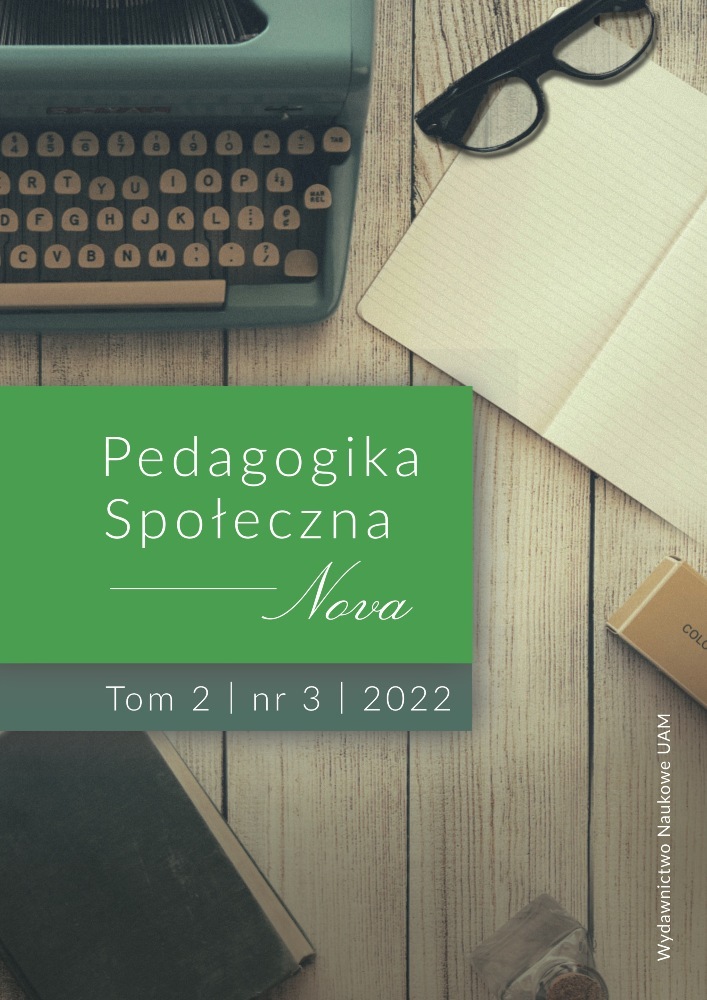Abstract
The study is devoted to the phenomenon of educational inequalities, in particular between the city and the countryside, which I treat as the basic source of all inequalities in modern society. Access to education and participation in the education system is the main source of human social advancement in the contemporary world. Access to education is governed by national law and international treaties. On the other hand, participation in education was conditioned in the past by social and moral circumstances (e.g. women’s education, state policy in the Polish nobility), while today it depends mainly on economic conditions. All indicators measuring the level of development and the situation of the material conditions of town and village inhabitants show a profound differentiation of the economic situation between these two environments, always to the detriment of the countryside. The origins of these inequalities should be seen both in the historical conditions, which were almost tragic for the countryside, in the form of one of the cruellest, oppressive forms of serfdom and in modern times, which imposed absolute servitude on the countryside, e.g. compulsory supplies, taking away all development capital from farmers. And this unfriendly economic policy towards the countryside is continued by the current authorities, which, by creating the appearance of financial “charity” in the form of spectacular, one-off gestures, excluded the village from the process of civilization advancement, which was exemplified in the times of real socialism by, for example, electrification of villages. Today, the symptoms of economic, and hence cultural handicap, include communication exclusion; the liquidation of cultural infrastructure; exclusion of a rural child from all developmental and extracurricular activities - which automatically condemns them to intellectual secondary; an increase in the cost of education, commercial fees for boarding schools and boarding houses; the carelessness of the government for the health of rural children., ...The development strategy and the mythical economic order do not create any illusions that the economic and cultural advancement of villages is the subject of the government’s concern for the balanced development of all environments, especially the disadvantaged ones. In the field of educational advancement of villages, in the light of the announced declarations of the Ministry of Education, all hopes must be abandoned. The blockade of the social character of the school, its removal from the influence of the self-government and the community of parents, grotesque declarations of the curricular goals of education, and the omnipotence of probation officers, which have never brought good fruit in history, take away hope for the chances of promotion and equality.
References
Dutkowa R., Dybiec J., Hajdukiewicz L. (red.), Studia z dziejów oświaty i kultury umysłowej w Polsce XVIII–XX w., Wrocław 1977.
Encyklopedia katolicka, t. 20, Lublin 2014.
Halamska M., Ciągłość i zmiana. Wieś polska 1918–2018. W poszukiwaniu źródeł teraźniejszości, Warszawa 2020.
Janicki K., Pańszczyzna. Prawdziwa historia polskiego niewolnictwa, Poznań 2021.
Jaroch K., „Wczoraj zadzwoniła 9-latka z myślami samobójczymi”. Ile jest takich telefonów rocznie?, „Gazeta Wyborcza” 2022, 20 stycznia, s. 5.
Jarosz M. (red.), Wykluczeni. Wymiar społeczny, materialny i etniczny, Warszawa 2008.
Klebaniuk J. (red.), Fenomen nierówności społecznych, Warszawa 2007.
Kowalak T., Marginalność i marginalizacja społeczna, Warszawa 1998.
Landes D.S., Bogactwo i nędza narodów. Dlaczego jedni są tak bogaci, a inni tak ubodzy, przeł. H. Jankowska, Warszawa 2000.
Leder A., Prześniona rewolucja. Ćwiczenia z logiki historycznej, Warszawa 2014.
Leszczyński A., Ludowa historia Polski. Historia wyzysku i oporu. Mitologia panowania, Warszawa 2020.
Mały rocznik statystyczny 1937.
Marzec-Holka K., Guzy-Steinke H. (red.), Kapitał społeczny a nierówności. Kumulacja i redystrybu- cja, Bydgoszcz 2009.
Michalunio Cz. (red.), Dicta. Zbiór łacińskich sentencji, przysłów, zwrotów, powiedzeń, Kraków 2004.
Niesprawiedliwy Start. Nierówności edukacyjne wśród dzieci w krajach wysoko rozwiniętych, UNICEF 2018.
Oświata i Wychowanie w roku szkolnym 2019/2020, GUS, Warszawa 2020.
Pasek J.Ch., Pamiętniki, Wrocław 1952.
Piketty T., Ekonomia nierówności, przeł. A. Bilik, Warszawa 2015.
Pilch T. (red.), Uczniowie na drogach Warmii i Mazur. Narodziny nierówności, Olsztyn 2016.
Pobłocki K., Chamstwo, Wołowiec 2021.
Putkiewicz E., Zahorska M., Społeczne nierówności edukacyjne, Warszawa 2001.
Raport Doing Children. Families and Children, OECD, 2009, http://www.oecd.org [dostęp: 29.12.2021].
Raport o rozwoju społecznym. Dostęp do edukacji, UNDP, Warszawa 1998.
Raport o Rozwoju Społecznym. Polska 1995, Warszawa 1995.
Raport o rozwoju społecznym. Rozwój obszarów wiejskich, UNDP, Warszawa 2000.
Raport o stanie wsi, Fundacja na Rzecz Rozwoju Polskiego Rolnictwa, Warszawa 2002.
Równe szanse dla dzieci. Nierówności w zakresie warunków i jakości życia dzieci w krajach bogatych, Innocenti Report, UNICEF, 2016.
Rudnicki Sz., Działalność polityczna polskich konserwatystów 1918–1926, Wrocław 1981.
Toffler A. i H., Budowa nowej cywilizacji, przeł. J. Łoziński, Poznań 1996.
Wołoszyn S., Źródła do dziejów wychowania i myśli pedagogicznej w zarysie, t. 3, wyd. II rozszerzone, Warszawa 1998.
Wroczyński R., Dzieje oświaty polskiej 1795–1945, Warszawa 1980.
Wroczyński R., Koncepcja uniwersytetu ludowego I. Solarza i jej źródła, [w:] Ignacy Solarz i jego uniwersytet ludowy 1924–1939, materiały z seminarium naukowego odbytego w Warszawie 5 i 6 X 1962 roku. Wybór i opracowanie F. Popławski, St. Dyksiński, Warszawa 1965.

